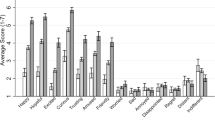Abstract
This paper presents an example where the set of subgame-perfect equilibrium payoffs of the infinitely repeated game without public randomization is not convex, no matter how large the discount factor is. Also, the set of pure-strategy equilibrium payoffs is not monotonic with respect to the discount factor in this example. These results are in sharp contrast to the fact that the equilibrium payoff set is convex and monotonic if public randomization is available.
Similar content being viewed by others
References
Abreu D, Dutta P, Smith L (1994) The folk theorem for repeated games: a NEU condition. Econometrica 62: 939–948
Abreu D, Pearce D, Stacchetti E (1990) Toward a theory of discounted repeated games with imperfect monitoring. Econometrica 58: 1041–1063
Ellison G (1994) Cooperation in the prisoner’s dilemma with anonymous random matching. Rev Econ Stud 61: 567–588
Fudenberg D, Maskin E (1986) The folk theorem in repeated games with discounting and with incomplete information. Econometrica 54: 533–554
Fudenberg D, Maskin E (1991) On the dispensability of public randomization in discounted repeated games. J Econ Theory 53: 428–438
Fudenberg D, Levine D, Maskin E (1994) The folk theorem with imperfect public information. Econometrica 62: 997–1040
Fudenberg D, Levine D, Takahashi S (2007) Perfect public equilibrium when players are patient. Games Econ Behav 61: 27–49
Kandori M (1992) The use of information in repeated games with imperfect monitoring. Rev Econ Stud 59: 581–593
Mailath G, Samuelson L (2006) Repeated games and reputations: long-run relationships. Oxford University Press, New York
Mailath G, Obara I, Sekiguchi T (2002) The maximum efficient equilibrium payoff in the repeated prisoners’ dilemma. Games Econ Behav 40: 99–122
Olszewski W (1998) Perfect folk theorems. Does public randomization matter?. Int J Game Theory 27: 147–156
Salonen H, Vartiainen H (2008) Valuating payoff streams under unequal discount factors. Econ Lett 99: 595–598
Sorin S (1986) On repeated games with complete information. Math Oper Res 11: 147–160
Wen Q (1994) The ‘folk theorem’ for repeated games with complete information. Econometrica 62: 949–954
Author information
Authors and Affiliations
Corresponding author
Rights and permissions
About this article
Cite this article
Yamamoto, Y. The use of public randomization in discounted repeated games. Int J Game Theory 39, 431–443 (2010). https://doi.org/10.1007/s00182-009-0219-9
Accepted:
Published:
Issue Date:
DOI: https://doi.org/10.1007/s00182-009-0219-9




